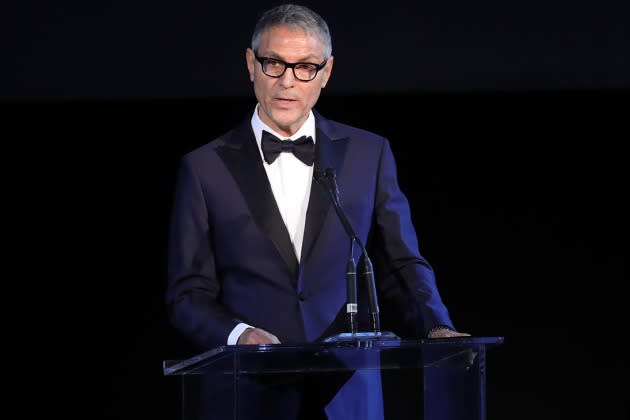Ari Emanuel: Star Paychecks Aren’t Under Fire Even as Studios Cut Costs
- Oops!Something went wrong.Please try again later.
- Oops!Something went wrong.Please try again later.

Ari Emanuel is now sleeping eight hours a night, up from four. The Endeavor chief attributes his better night’s sleep to reducing debt at his entertainment, sports and representation firm from $5.43 billion in September to $5.17 billion at the end of last year.
“We’ve taken the company from 8x levered to below 4x,” the mogul told a Morgan Stanley investor conference Wednesday, adding: “I’d sleep a lot more if I got it lower.” Yet, perhaps in typical Emanuel fashion, the Endeavor CEO said the company would work on that metric to such an extent “everybody’s going to say, ‘Well you don’t have to go that low on your debt.’”
More from The Hollywood Reporter
Endeavor Invests in Nonfiction Label Asylum Entertainment Group
Endeavor Quietly Invested in Elon Musk's Twitter Earlier This Year
Live Events Boost Endeavor, as Ari Emanuel Says Firm Is "Well-Positioned" Even if Writers Strike
The agent had a few pointed remarks aimed at the narrative of an overall industry pullback in content spending, as well as the thrifty commentary that studio chiefs have been doling out to Wall Street crowds as investors look for profit, rather than streaming growth. “When they say they’re going to cut back, instead of doing 30-day shoots they’re going to do 25 days,” Emanuel noted of studios. “They’re not not paying Keanu Reeves or Mark Wahlberg or Matt Damon or Ben Affleck or Marty Scorsese. They’re paying those people. They have to figure out their cost-savings someplace else.”
Since Netflix’s massive stock correction in April of last year, the buzzwords of “streaming subscriber growth” have been replaced by “cash never lies,” to quote the mantra of Warner Bros. Discovery CEO David Zaslav’s right-hand man, CFO Gunnar Wiedenfels. “Everybody is readdressing their model,” Emanuel noted. “So now, because of David Zaslav, they’re going to do theatrical because it’s more valuable.”
Over the past year, studios have embarked on a spree of layoffs, mergers and cost-cutting efforts as the imperative to grow subscribers for platforms like Disney+ or HBO Max or Paramount+ or Peacock dissolved into showing when those services can become profitable. (None of the major studios’ streaming divisions are profitable right now, in contrast to Netflix.) “The streamers that are in the old linear business have to defend that linear business still,” the Endeavor chief noted. “ABC, NBC, CBS and all the cable broadcasters, yes, they’re going down in ratings but they’re still existing and there’s an ecosystem there, they have to go there.”
Emanuel — who presides over the parent company of agencies WME and IMG, sports league UFC, events firm On Location and online gambling platform OpenBet — aimed to portray his representation business as more insulated from some of what he described as “reviewing economics on movies and television” concerns.
Noting that WME also represents speakers, broadcasters, touring musicians and comedians, as well as talent on film or TV, the exec added: “The movie and television business inside WME is less than 50 percent of the economics” of the firm. (During a Feb. 28 earnings call, Emanuel gave some more specific figures: In 2022, WME booked talent deals for 40,000 music engagements, 310 broadcast or streaming series, 200 books, and “our clients wrote and/or directed five of the top 10 films at the domestic box office.”)
During the Morgan Stanley chat, Emanuel took interest in touting the flywheel and synergistic aspects of his collection of assets, contending that they’re undervalued collectively by Wall Street. Of his agency rivals, he claimed that CAA paid 15 times the value of ICM in its $750 million megadeal for the agency, and that UTA (which Emanuel described as “a very small company”) took investment at a similar valuation multiple. “You guys value William Morris, which is the largest of all of them…at three times,” Emanuel added.
Asked about M&A opportunities, Emanuel demurred, but outlined the rationale for any potential acquisitions to bolster his Beverly Hills-based firm, which already counts 7,700 employees globally. “We’ve got to be able to cut costs, we’ve got to be able to grow revenues across multiple categories and then we have to be able — because of our footprint — to figure out ways to benefit the flywheel or take the asset internationally,” he said.
Since Jan. 3, the first day of trading this year, Endeavor stock has risen 10 percent to $23.50 a share, but still sits below the $27.56 a share price it closed at on its first day as a public company in 2021.

